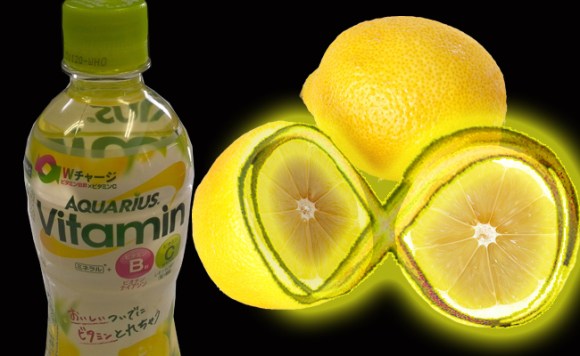
For some reason Japanese people love them some excessive amounts of vitamin C. Go to any convenience store or supermarket and your sure to find competing brands of drinks all loaded with the recommended daily intake of the stuff several times over.
But really, how many of us know off-hand what the daily recommended intake is? That’s why back in 2009 the Japan Soft Drink Association (JSDA) came up with a new labeling system that measures the amount of vitamin C added in units of lemons. I’m not sure how that actually makes it any clearer, but at least its something.
However, in the process it seems they have inadvertently created a formula that shows how a single lemon contains an infinite amount vitamin C.
■ “This drink has 50 lemons worth of vitamin C”
The JSDA came up with the lemon measurement scheme after they received many requests from drink makers to establish a universal way to advertise the amount of vitamin C to make it easier for consumers to understand.
And so a study was conducted in cooperation with the Japan Association of Fruit Juice to determine how much vitamin C was in a single lemon so they could use it as a unit of measurement.
Working from Ministry of Health Labor and Welfare data, they assumed an average lemon to be 120 grams, 30 percent of which was juice. They also learned that 100 grams of juice has 50 milligrams of vitamin C inside. And so:
In the end they rounded that up to an even 20 milligrams of vitamin C in a single lemon and the standard was set. For example, this bottle of Aquarius Vitamin I just purchased boasts 1,000 milligrams of vitamin C or “50 lemons worth of vitamin C” — that’s over 11 times the recommended daily intake for an adult male and a good chance I’ll be getting a tummy ache in the near future.
■ The plot infinitely thickens
This was pretty old news until a Twitter user named Sarapon, who appears to be a puppet, came across it and found an interesting statistic.
“According to the Japan Soft Drink Association guidelines the amount of vitamin C in one lemon is about 20 milligrams. Since an actual lemon contains 80 milligrams of vitamin C, one lemon contains the vitamin C of four lemons.”
[tweet https://twitter.com/sarapon/status/619023206268010496 align=center]Other Twitter users extrapolated that theory to its logical conclusion: One lemon contains the vitamin C of an infinite number of lemons. This is assuming the amount of vitamin C in a lemon does not equal zero…but come on. That would be silly now, wouldn’t it.
However, Sarapon made the classic mistake of a C student by failing to show its work, leaving us wondering where that “80 milligrams of vitamin C in a real lemon” figure came from. Never one to trust the scientific rigor of a puppet, I decided to investigate.
According to the Ministry of Education, Culture, Sports, Science and Technology (MEXT), the amount of vitamin C in a whole raw lemon is 100 milligrams per 100 grams.
The data doesn’t specify whether that includes the vitamin-rich peel, so Sarapon was probably fair in low-balling its estimate to 80 milligrams to account for the flesh of the lemon and the juice. The JSDA isn’t wrong either in using the 50 milligrams of vitamin C per 100 grams of juice either since that’s the only part of a lemon that people usually consume outside of a few oddballs (you know who you are).
However, by labeling their drinks as having a number of lemon’s worth of vitamin C rather than a number of lemon’s juice’s vitamin C, they were close to triggering a paradox of the sourest nature. Actually, the JSDA was always hip to that and added “converted to juice” in parenthesis just to dispel wiseguys like Sarapon. Because of this, one real lemon has the vitamin C of one lemon converted to juice, and balance is restored to the universe.
▼ “Vitamin C: 1000 mg – 50 Lemons (Converted to Juice)”
As for the rest of us, considering the difference between the vitamin C in the fruit’s flesh compared to the juice, we’d all be better off if we’d forego these fortified drinks altogether and just went and sucked on a lemon.
Source: Twitter – @sarapon, National Soft Drink Association, MEXT Food Composition Database (Japanese)
Lemon Images: Wikipedia – André Karwath, Bordercolliez (Edited by RocketNews24)
Other Images: RocketNews24

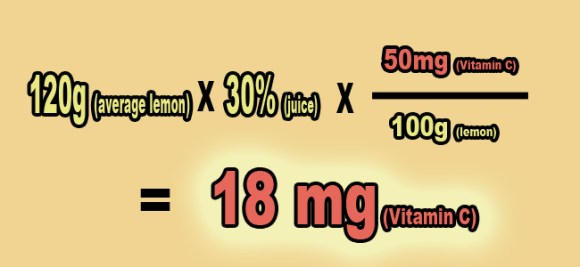
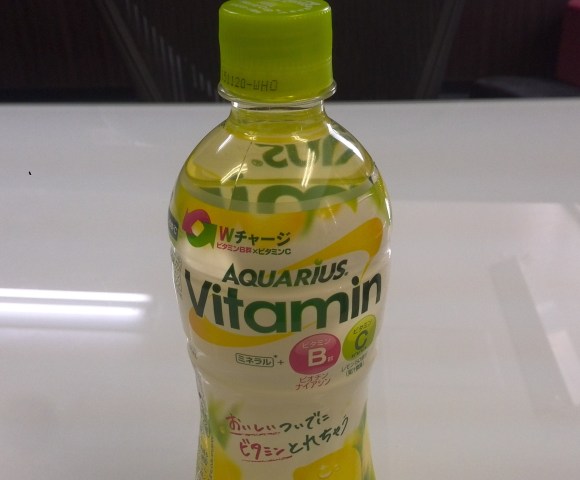
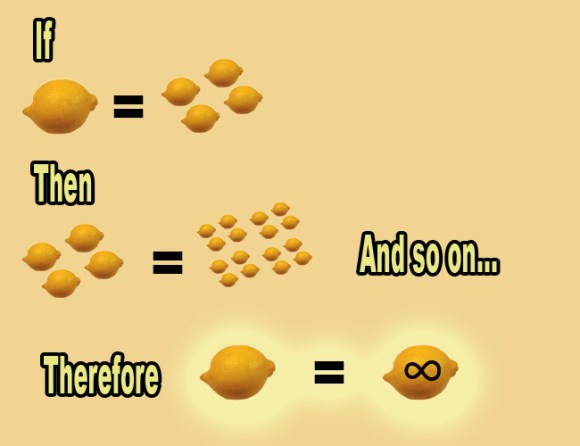
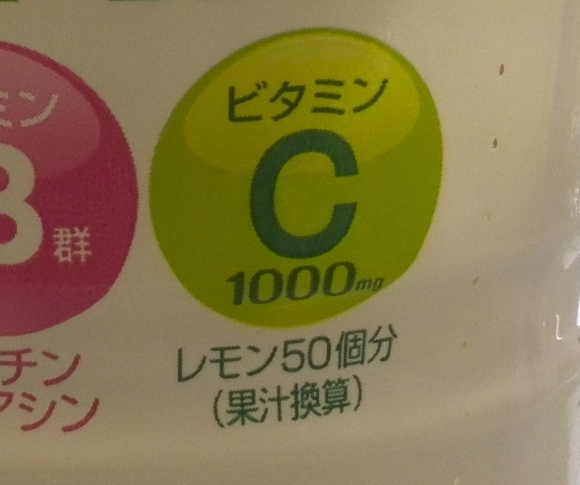
 The best Hobonichi diaries, covers and stationery for 2026
The best Hobonichi diaries, covers and stationery for 2026 Ramen for 99 yen?!? Best value-for-money noodles found at unlikely chain in Japan
Ramen for 99 yen?!? Best value-for-money noodles found at unlikely chain in Japan Potama serves up epic rice balls like no other, and there’s only one store in Tokyo
Potama serves up epic rice balls like no other, and there’s only one store in Tokyo Which convenience store onigiri rice balls are the most popular? Survey reveals surprising results
Which convenience store onigiri rice balls are the most popular? Survey reveals surprising results Starbucks Japan releases first-ever Hinamatsuri Girls’ Day Frappuccino
Starbucks Japan releases first-ever Hinamatsuri Girls’ Day Frappuccino The best Hobonichi diaries, covers and stationery for 2026
The best Hobonichi diaries, covers and stationery for 2026 Ramen for 99 yen?!? Best value-for-money noodles found at unlikely chain in Japan
Ramen for 99 yen?!? Best value-for-money noodles found at unlikely chain in Japan Potama serves up epic rice balls like no other, and there’s only one store in Tokyo
Potama serves up epic rice balls like no other, and there’s only one store in Tokyo Which convenience store onigiri rice balls are the most popular? Survey reveals surprising results
Which convenience store onigiri rice balls are the most popular? Survey reveals surprising results Starbucks Japan releases first-ever Hinamatsuri Girls’ Day Frappuccino
Starbucks Japan releases first-ever Hinamatsuri Girls’ Day Frappuccino The fish in rural Fukui that rivals Japan’s most auspicious sea bream
The fish in rural Fukui that rivals Japan’s most auspicious sea bream Japan’s craziest burger chain takes menchi katsu to new extreme levels
Japan’s craziest burger chain takes menchi katsu to new extreme levels Eevee returns to Japan’s famous Tokyo Banana, bundled with a cute tote bag
Eevee returns to Japan’s famous Tokyo Banana, bundled with a cute tote bag We find the best “homestyle” onigiri at a super local chain of convenience stores
We find the best “homestyle” onigiri at a super local chain of convenience stores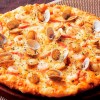 10 crazy pizzas from Japan
10 crazy pizzas from Japan Japanese restaurant chain serves Dragon Ball donuts and Senzu Beans this spring
Japanese restaurant chain serves Dragon Ball donuts and Senzu Beans this spring Highest Starbucks in Japan set to open this spring in the Tokyo sky
Highest Starbucks in Japan set to open this spring in the Tokyo sky Tokyo Skytree turns pink for the cherry blossom season
Tokyo Skytree turns pink for the cherry blossom season Japan Extreme Budget Travel! A trip from Tokyo to Izumo for just 30,000 yen [Part 1]
Japan Extreme Budget Travel! A trip from Tokyo to Izumo for just 30,000 yen [Part 1] Yakuzen ramen restaurant in Tokyo is very different to a yakuza ramen restaurant
Yakuzen ramen restaurant in Tokyo is very different to a yakuza ramen restaurant Japan has only one airport named after a samurai, so let’s check out Kochi Ryoma【Photos】
Japan has only one airport named after a samurai, so let’s check out Kochi Ryoma【Photos】 Japanese drugstore sells onigiri at pre-stupid era prices, but how do they compare to 7-Eleven?
Japanese drugstore sells onigiri at pre-stupid era prices, but how do they compare to 7-Eleven? Japan Extreme Budget Travel! A trip from Tokyo to Izumo for just 30,000 yen [Part 2]
Japan Extreme Budget Travel! A trip from Tokyo to Izumo for just 30,000 yen [Part 2] Adorable Totoro acorn key holders come with a special guest hidden inside[Photos]
Adorable Totoro acorn key holders come with a special guest hidden inside[Photos] Japan’s newest Shinkansen has no seats…or passengers [Video]
Japan’s newest Shinkansen has no seats…or passengers [Video] Starbucks Japan releases new sakura goods and drinkware for cherry blossom season 2026
Starbucks Japan releases new sakura goods and drinkware for cherry blossom season 2026 Foreigners accounting for over 80 percent of off-course skiers needing rescue in Japan’s Hokkaido
Foreigners accounting for over 80 percent of off-course skiers needing rescue in Japan’s Hokkaido Super-salty pizza sends six kids to the hospital in Japan, linguistics blamed
Super-salty pizza sends six kids to the hospital in Japan, linguistics blamed Starbucks Japan unveils new sakura Frappuccino for cherry blossom season 2026
Starbucks Japan unveils new sakura Frappuccino for cherry blossom season 2026 Foreign tourists in Japan will get free Shinkansen tickets to promote regional tourism
Foreign tourists in Japan will get free Shinkansen tickets to promote regional tourism The 10 most annoying things foreign tourists do on Japanese trains, according to locals
The 10 most annoying things foreign tourists do on Japanese trains, according to locals Take a trip to Japan’s Dododo Land, the most irritating place on Earth
Take a trip to Japan’s Dododo Land, the most irritating place on Earth Naruto and Converse team up for new line of shinobi sneakers[Photos]
Naruto and Converse team up for new line of shinobi sneakers[Photos] Is China’s don’t-go-to-Japan warning affecting the lines at a popular Tokyo gyukatsu restaurant?
Is China’s don’t-go-to-Japan warning affecting the lines at a popular Tokyo gyukatsu restaurant? Survey asks foreign tourists what bothered them in Japan, more than half gave same answer
Survey asks foreign tourists what bothered them in Japan, more than half gave same answer Japan’s human washing machines will go on sale to general public, demos to be held in Tokyo
Japan’s human washing machines will go on sale to general public, demos to be held in Tokyo Starbucks Japan releases new drinkware and goods for Valentine’s Day
Starbucks Japan releases new drinkware and goods for Valentine’s Day We deeply regret going into this tunnel on our walk in the mountains of Japan
We deeply regret going into this tunnel on our walk in the mountains of Japan Studio Ghibli releases Kodama forest spirits from Princess Mononoke to light up your home
Studio Ghibli releases Kodama forest spirits from Princess Mononoke to light up your home Major Japanese hotel chain says reservations via overseas booking sites may not be valid
Major Japanese hotel chain says reservations via overseas booking sites may not be valid Put sesame oil in your coffee? Japanese maker says it’s the best way to start your day【Taste test】
Put sesame oil in your coffee? Japanese maker says it’s the best way to start your day【Taste test】 No more using real katana for tourism activities, Japan’s National Police Agency says
No more using real katana for tourism activities, Japan’s National Police Agency says The fish in rural Fukui that rivals Japan’s most auspicious sea bream
The fish in rural Fukui that rivals Japan’s most auspicious sea bream Japan’s craziest burger chain takes menchi katsu to new extreme levels
Japan’s craziest burger chain takes menchi katsu to new extreme levels Eevee returns to Japan’s famous Tokyo Banana, bundled with a cute tote bag
Eevee returns to Japan’s famous Tokyo Banana, bundled with a cute tote bag We find the best “homestyle” onigiri at a super local chain of convenience stores
We find the best “homestyle” onigiri at a super local chain of convenience stores 10 crazy pizzas from Japan
10 crazy pizzas from Japan Larger than life Doraemon doll will delight fans, terrify pets and small children
Larger than life Doraemon doll will delight fans, terrify pets and small children 7-Eleven Japan’s sakura sweets season is underway right now!
7-Eleven Japan’s sakura sweets season is underway right now! Japan Extreme Budget Travel! A trip from Tokyo to Izumo for just 30,000 yen [Part 2]
Japan Extreme Budget Travel! A trip from Tokyo to Izumo for just 30,000 yen [Part 2] Tokyo street sweets: The must-snack treats of Nakano’s Refutei
Tokyo street sweets: The must-snack treats of Nakano’s Refutei Okinawa soul food: We try the most epic pork and egg onigiri rice balls in Japan
Okinawa soul food: We try the most epic pork and egg onigiri rice balls in Japan Zara creates loungewear that looks like a Japanese school P.E. uniform
Zara creates loungewear that looks like a Japanese school P.E. uniform Ghibli’s Kiki’s Delivery Service returns to theaters with first-ever IMAX screenings and remaster
Ghibli’s Kiki’s Delivery Service returns to theaters with first-ever IMAX screenings and remaster Starbucks Japan unveils new Sakura Frappuccino for cherry blossom season 2025
Starbucks Japan unveils new Sakura Frappuccino for cherry blossom season 2025